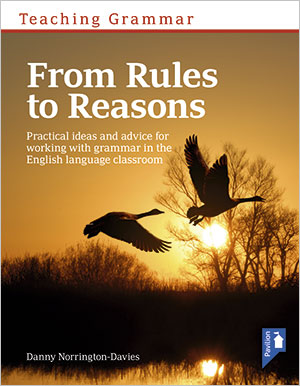An Interview with Danny Norrington-Davies: the benefits of reasons over rules of grammar in an English classroom
In what ways do you believe considering the reasons of grammar will it benefit students?
Looking at reasons rather than just at rules gives students more accurate and appropriate descriptions of meaning than some of the rules found in course-books or other teaching materials. Students can formulate the reasons themselves, making it easier for them to understand them, and possibly more memorable. It also encourages students to genuinely think for themselves, which I believe is a really important part of learning a language.
Considering reasons over rules also helps students develop language awareness, which can really help in their future learning. It gives them opportunities for meaningful and genuine interaction and communication, based upon a greater understanding of how language and grammar can be used. This is a key aspect of learning a language, and I believe that no approach to language teaching can be successful without it.
What benefits will this new approach have for teachers?
The benefits of this approach can vary for teachers at different stages of their development. For newer teachers, I think it can help them develop a greater level of language awareness than they can get from studying the rules. It can also help new teachers answer questions that students have about grammar, which is often one of the biggest causes of anxiety. They don’t have to know the rule or say that they will go off and find it. Instead, they can work with the learners to discover the reason why a speaker or writer is using the particular item. This takes away a lot of that pressure, whilst helping improve the understanding of the student.
For those more experienced teachers, rules of grammar can cause a different problem. These teachers often know all the rules, but can also become more troubled by the exceptions. This approach gets rid of that worry, and the difficulties of explaining them, as there are no exceptions, just reasons.
What have you noticed about the lessons you have given using your approach?
To me, it has become clear that once students have started considering reasons rather than rules, they can be extremely insightful when it comes to working out why speakers and writers use certain forms. Learners can come up with very astute and very appropriate reasons why speakers and writers use the language that they do. “I’ve also noticed that as learners prepare for communicative tasks, they will often use their reasons to justify why they might use a specific form or to explain why a tense or structure might not be best one to use. This shows that the approach can really get students thinking about and engaged with the language, so they are actively making decisions based on their understanding of the language. This is something which I believe will have a very positive effect in the long run.
Finally, what other advice on teaching grammar can you give for language teachers?
Along with suggesting that teachers look for reasons instead of rules, I think it’s important that we encourage our learners to look at language in texts rather than isolated sentences. It’s also important to think about the type of text we’re using and what the writer or speaker wants to convey. “The other thing to say is - don’t be afraid to let students work things out for themselves. They can, and when they do, it can be very motivating. It can also be incredibly eye-opening.
Teaching Grammar: From Rules to Reasons is available to pre-order at https://www.etprofessional.com/teaching-grammar-from-rules-to-reasons/, where it is available at a launch price of £23.95 instead of £29.95.

Comments
Write a Comment
Comment Submitted